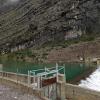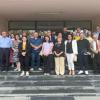Search
Displaying Results 1 - 25 of 52
Montenegro has validated the preliminary results of the country’s Needs Assessment as part of a project to strengthen evidence‐based environmental governance and sustainable environmental policies in support of the 2030 Agenda in South‐East Europe. The project, which is implemented by UNECE and
The Fourth Cycle of UNECE Environmental Performance Reviews (EPR) is underway with the fourth review of Montenegro, carried out under the leadership of UNECE.
A large, multidisciplinary team of international experts worked in Podgorica from 22 to 30 April 2024, assessing the environmental
Experts from Albania and Montenegro met in Shkoder (Albania) on 25 April 2023 to progress with the exchange of information on the shared Cijevna/Cem River. This was the second meeting of the joint technical group on monitoring and assessment established upon recommendation of the Implementation
In recent years, Montenegro and its capital city, Podgorica, have been committed to accelerate sustainable and smart urban development through a variety of ambitious national and regional and local measures, such as digitalization of public services, modernization of public transport, and to
Strengthening environmental governance and the development of environmental policies both play an important role in the achievement of many of the Sustainable Development Goals (SDGs). On 11–12 February 2019, a UNECE expert mission visited ministries and stakeholders in Podgorica to kick off a
Guaranteeing safe access to drinking water and sanitation remains a challenge in the pan-European region, with 16 million people still lacking access to basic drinking water services and over 29 million people not having access to basic sanitation, including hundreds of thousands who have to
How can countries best harness transport and trade to drive progress in achieving the Sustainable Development Goals (SDGs)? How can enhancing countries’ statistics on trade and transport support this process? This was the focus of discussions at a workshop organized last week by UNECE in
Montenegro, The former Yugoslav Republic of Macedonia, Croatia and Serbia plead for strengthening the regional cooperation between neighboring countries on roundwood trade. Knowledge and experience exchange together with realistic figures of roundwood removals are crucial to address the problem
After countries in Eastern Europe and Central Asia experienced a marked decline in poverty rates at the beginning of the 2000s, there was concern that the 2008 economic crisis might halt or even reverse this trend. However, in most Eastern European and Central Asian countries with poverty data,
We all commute daily for work or leisure purposes. Public or private transport is an integral part of our lives and plays a fundamental role for social and economic development, connecting people and economies. At the same time, the transport sector puts significant pressures on the environment
The development plans in Bosnia and Herzegovina, Montenegro and Serbia, the countries that share the Drina Basin, need to be assessed for their impact on the ecosystems but also across sectors, in particular energy, agriculture and water management. These plans include some 20 new hydropower
The Mediterranean Region, home to over 510 million people, is an important crossroads for economic, social and cultural exchanges between Europe, Africa, Asia and other continents. The region is rich in biodiversity, but has come under pressure due to the intensive exploitation of mineral resources
As early as 1995, the Beijing Platform called for the active involvement of women in decision making; the integration of gender concerns and perspectives in policies and programmes with sustainable development; and the establishment of mechanisms at all levels to undertake a gender impact
Developing the capacity of statistical systems to respond to ever-changing demands is a core component of UNECE statistical work, linked directly to several of the targets of the 2030 Agenda for Sustainable Development. Key tools used for capacity development have traditionally been face-to-face
How can we create new opportunities for integrated investment projects and to support sustainable development of water and energy resources in the Drina river basin, shared by Montenegro, Bosnia and Herzegovina and Serbia? How can potential trade-offs be limited in favour of harnessing
The percentage of women in parliament has increased across the UNECE region over the last ten years, bringing the average in UNECE member countries from 19% in 2005 to 25% in 2015. In 2015, women accounted for at least 10% of members in all national parliaments. In 2005, 9 countries were
As Europe advances towards a green and digital economy, the demand for Critical Raw Materials (CRMs) - such as lithium, nickel, rare earth elements and cobalt - is surging. The European Critical Raw Materials Act (CRMA) aims to secure stable and resilient CRM supply chains by setting benchmarks
The Executive Secretary will be in Madrid on 23 February to participate in the sixth meeting of the Environment and Health Ministerial Board. On this occasion the Ministers of Environment of Armenia, Montenegro, Portugal and the Russian Federation, who were appointed by the Committee on
The Drin River basin, shared by five Riparians: Albania, Greece, Kosovo (UNMIK, Security Council resolution 1244), Montenegro and The Former Yugoslav Republic of Macedonia, faces several acute challenges, such as loss of biodiversity, pollution and frequent floods. The basin includes three major
Enrolment in childcare varies considerably within the UNECE region. While in Denmark two thirds of children under 3 are registered in childcare facilities, in Poland and Tajikistan less than 5% are. However, some countries with low rates of childcare enrolment at the beginning of the
Ambition turns into practice in BudvaThe transformation of our world starts today. The 2030 Agenda for Sustainable Development and environmental democracy are at the centre of the Meetings of the Parties to the UNECE Convention on Access to Information, Public Participation in Decision-making
Experts from UNECE member States and the secretariat will be visiting Bulgaria from 11 to 21 April 2016 for a field mission in the framework of the third environmental performance review (EPR) of the country. The team will meet governmental officials and representatives of international
UNECE and the Renewable Energy Policy Network for the 21st Century (REN21), in close cooperation with the International Energy Agency (IEA), have joined forces to develop the UNECE Renewable Energy Status Report, which aims at closing the data and information gap as well as tracking future
Thanks to UNECE and its Environmental Monitoring and Assessment Programme, the global “data revolution” needed to ensure sustainable development and monitor progress in achieving the future sustainable development goals (SDGs) is well under way in the countries of Eastern and South-Eastern Europe
Tackling inequality between women and men in the sharing of power and decision-making at all levels is essential to strengthen democracy and achieve peace and sustainable development. Back in 1995, this was identified as one of twelve critical areas of concern in the landmark Beijing Platform









